If you’re currently going through menopause, you’re likely experiencing all the joys of hot flashes, mood swings, and maybe some stubborn belly fat. (Can you hear my sarcasm yet?) Hormonal fluctuations during menopause can bring on a whole host of unpleasant symptoms, and while there is plenty of advice on how to deal with menopause, there’s one dietary culprit you may not know that’s exacerbating your symptoms: sugar. Read on to learn how sugar affects your menopause symptoms, and what to eat instead to regulate your hormones.
The Connection Between Sugar & Estrogen

Studies have shown that women with diets high in sugar can experience worse menopausal symptoms than women with diets low in sugar. One study in particular followed 6,000 women for 9 years, and the results showed that women whose diets were high in sugar were 20% more likely to experience hot flashes and night sweats than their lower-sugar counterparts. Why did this occur? It all has to do with estrogen.
Estrogen levels fluctuate a lot during peri-menopause. It’s these dramatic spikes and falls in estrogen that can cause uncomfortable symptoms like hot flashes and night sweats. And after you consume a lot of sugar, your insulin levels spike, which simultaneously lowers the amount of a protein in your body called SHBG (Sex Hormone Binding Globulin). When your SHBG decreases, your estrogen goes up. In essence, eating a lot of sugar will cause an estrogen spike. So if you’re consuming a lot of sugar, your body’s already-fluctuating estrogen will take bigger spikes and falls, worsening your menopausal symptoms.
Related: 10 Ways To Deal With Your Menopause Symptoms
How To Make Dietary Choices That Keep You Healthy During Menopause
So now you know excess sugar can pose a problem for your night sweats and hot flashes, but just how much is too much—and what are you supposed to do about it? Here are our suggestions.
-
Limit sugar as much as possible.
If you can’t totally cut out sugar, just aim to keep your daily sugar consumption to less than 10 grams at a time. (A small cookie now and then should not be off limits!) Whenever possible though, try to snack on fruit when you’re craving something sweet. Fruit has natural sugar combined with fiber, which will not spike your insulin levels (and therefore your estrogen levels) the same way.
-
Cut back on caffeine.
Caffeine also causes an estrogen spike, not to mention it interferes with sleep which can already be a problem during menopause. Stick to less than 100 mg per day—roughly 1 to 2 cups of coffee—to avoid exacerbating your symptoms. And don’t drink it after noon, when it has a higher chance of interfering with your slumber.
-
Try a Mediterranean diet.
Studies have shown that menopausal woman who ate a Mediterranean diet had less severe menopausal symptoms than those who did not. What does eating a Mediterranean diet consist of? Fish, fruits, veggies, healthy fats like olive oil, avocados, nuts and seeds and yes—a little red wine now and then! And garlic!
-
Get your fiber.
Getting fiber from fruits, veggies, and whole grains helps lower and stabilize estrogen levels, instead of causing them to spike and fluctuate when you’re eating lots of sugary substances.
-
Stay ultra hydrated!
- If you’re suffering from night sweats and hot flashes, you want to make sure to drink plenty of water to replenish lost fluids and keep your body healthy.
-
Eat flaxseeds.
Flaxseeds are a great source of healthy omega 3-fatty acids and they also contain a substance called lignins, which help regulate hormone metabolism. Sprinkle them on your yogurt, granola, or even salads to help regulate your menopause symptoms.